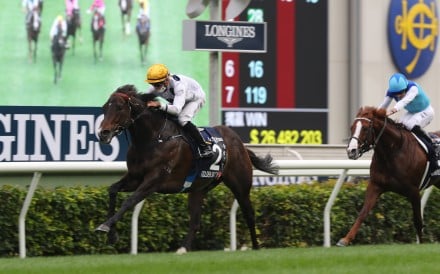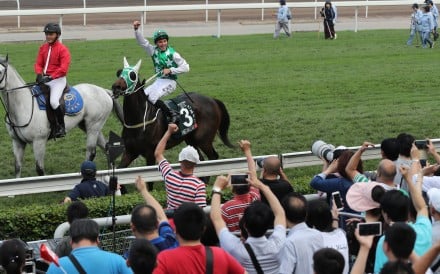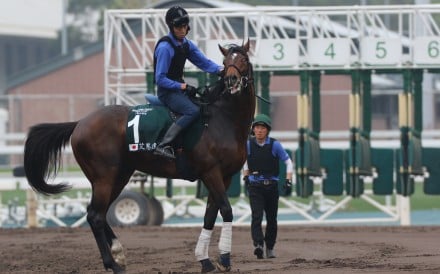Poring over the Hong Kong Jockey Club’s highly detailed “racing incident reports” is a necessity for any serious form student and not a bad idea for a part-time punter either – but you’d hardly call it an entertaining read.
As far as excitement-generation goes, most racing incident reports fall somewhere between a court transcript of a disputed traffic fine and watering instructions for a pot plant.
Nothing is left to chance in the post-race reports compiled by stewards; questions are asked of poor performances, explanations given from vets and trainers typically make more excuses than a Mong Kok landlord hears on rent day.
It’s where we go when we want to know what happened to that beaten favourite – was it a heart irregularity, blood in the trachea or our favourite substance, the gloriously named “mucopus” in the lungs, slowing the horse down?
It’s where we found out last season that former trainer Andy Leung Ting-wah sometimes didn’t bother going to the pre-race parade ring to greet owners (to be fair, he was probably afraid that all 20 shareholders in the horse might turn up at once).
Jockeys aren’t spared the scrutiny, either. The Eliot Ness-like Kim Kelly and his team of racetrack law enforcers ruthlessly cross-examine the riders of good things beaten, or bad things ridden cold, and painstakingly investigate replays from myriad angles like it’s the Zapruder film. The findings all go into the post-race analysis and, like a lot of things, other jurisdictions could take a good, hard look at what goes into them here (a lot) and what isn’t left out (not much).
The level of detail is welcome – and the incident reports are another example of “world’s best practice” for the Jockey Club, along with the cutting-edge track maintenance, form website, veterinary research and drug testing – but can we spice the writing style up a little bit, just to keep us awake?
Here’s a helpful example from early 2012: Maxime Guyon lashes out and strikes Keith Yeung Ming-lun with his whip. It had the local media salivating, but the stewards’ report was as dry as an oatmeal biscuit.
We understand the need to be direct and unbiased, but we could loosen things up a little bit, right? Couldn’t the stewards just include a subtle dig and speculate about Maxime’s fragile mental and emotional state at the time? Are a couple more adjectives too much to ask for? Our possible suggestions for improvements, take your pick, are in brackets:
“(The angry/frustrated/insecure Frenchman) Guyon (angrily/violently/pathetically) struck (a stunned/bemused) Yeung with his whip (and he appears to hit like a girl.)” We don’t want to go too far, lest the stewards’ room note-taker puts us racing reporters out of business.
What slows the stewards’ reports up considerably is the overly formal and repetitive use of prefixes – “jockey” and “trainer”. Here’s an example, and this is just plucked at random, totally hypothetical and, as they say in TV land, with “any likeness to any real person purely coincidental”:
“Jockey Gerard Mosse was reminded of his obligation to ride unplaced horses to the line. Jockey Mosse was also reminded of his need to seek to find cover and travel as close to the running rail as possible.”
I mean, we mentioned jockey Mosse was a jockey already, we don’t need to be reminding everyone in the next sentence.
One thing we wouldn’t welcome is the eagle eye of Killer Kelly’s gang watching over us for breaches of integrity in our day-to-day lives. Sometimes frustrations boil over in our crowded, hothouse environment. Life can be hard for Westerners here – once I was forced to iron a shirt myself – and people have been known to have to wait three minutes for a train on the Island Line.
An incident report from a trip on the MTR:
“Passenger HAPPY LUCKY DRAGON WIN, when crowded for room at exit A of Central MTR was bumped and lashed out with his foot at a fellow passenger. At the 10m mark, while continuing to behave erratically and over-race, passenger HAPPY LUCKY DRAGON WIN deliberately cut in front of another passenger when approaching the turnstile, leaving insufficient room. Passenger HAPPY LUCKY DRAGON WIN was found guilty under rule 125 (b) of careless walking and being an angry commuter. Passenger HAPPY LUCKY DRAGON WIN will be forced to take a tram from 20-9-13, and will be cleared to ride the MTR again after 4-10-13. Passenger HAPPY LUCKY DRAGON WIN was also advised to undergo anger management counselling before being allowed to ride again.”
Stewards being upholders of social etiquette isn’t a bad idea really, although it is a big job in Hong Kong. At least they have experience dealing with mucus when flu season comes around.
Cutting in line in taxi queues, “careless walking” on crowded sidewalks and operating a jackhammer like it’s a pogo stick at 10pm would all be areas open to the scrutiny of “society stewards”.
Insane green mini-bus drivers and reckless taxi drivers would obviously require their own separate stewards’ panel. And wouldn’t it be great to have an independent adjudicator to dish out some punishment to that mate who is always disappearing at the bar when it’s his turn to shout?
In the end, racing incident reports are a must-read for racing enthusiasts – but just like daily replays of track gallops on the HKJC website – you’ll just have to accept their sleep-inducing effects.



















